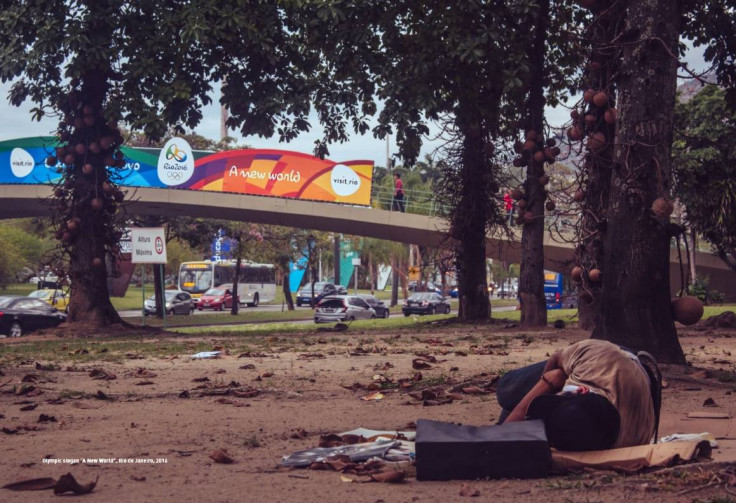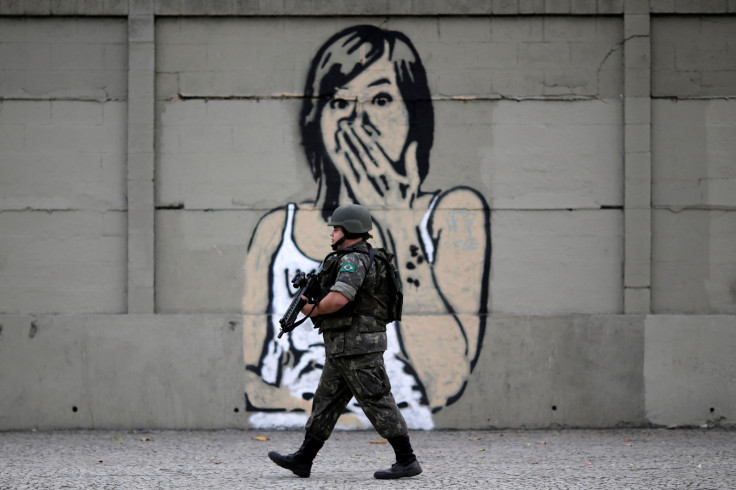The photo that sums up the devastating impact of the Olympics on Brazil's street children
International NGO alleges police brutality and efforts to 'clean up' streets of poor children.

A photograph of a Brazilian child sleeping rough on a Rio de Janeiro street below banners for the 2016 Olympic Games symbolises the devastating impact of the sporting event on thousands of children and young people in the city, according to a rights group.
Terre des Hommes, a network of 10 national children's rights organisations, has investigated what it claims to be violations of rights committed before and during the multi-sport event held in the Brazilian city of Rio de Janeiro between 5 August and 21 August 2016.
According to Rio City Hall's official data 22,000 families were evicted from their homes after Rio was chosen to host the Olympics, which had an official slogan of "New World". The rights group claims that as well as losing their homes, abuses of some Brazilian communities in the lead-up to the event only increased during the Olympics, which it says has failed on legacy expectations.
"A number of [rights] violations specifically affecting children and teenagers could be observed once the Games had begun," the group said in a report published on 29 September.
'Cleaning up streets' from poor children
In the run up to and during the 2014 Fifa World Cup, which also took place in Brazil, the group found municipal guards, together with inspection and sanitation institutions, would go through some city districts - generally in tourist areas - "collecting not only garbage and illegal merchandising from street vendors but also people and children living in the streets".
Despite a warning from the United Nations (UN) Committee on the Rights of the Child, the practice was repeated in the build-up to the Olympics. "No change in practice took place and the same violations continued right before and during the Olympics," Terre des Hommes stated.
"[We found] strong evidence that police abuse of children and adolescents living on the streets increased, including severe beatings."
Helena Dias, 17, who lives on Rio's streets, described witnessing violence a week before the Games.
While Helena sat on the streets with other youth in Laranjeiras, a white van drove up to the group. Someone she described as an official got out and hit one of the other children with a piece of wood with a nail attached to it. Pointing to an increase of attacks with this weapon and severe beatings during the event, Helena claimed "girls have been punched and hit, including on intimate parts of their bodies".

Poor black youth removed from privileged parts of Rio
The report indicates an increase of police violence against adolescents on the streets including through oppressive tactics and the use of force, as well as the intention of "cleaning up" the streets as the Games approached.
According to the rights group, the Brazilian authorities attempted to hide poor black young people from visitors by systematically stopping buses travelling from poorer northern zones to the beaches and tourist areas. Police sent teenagers, mostly young black youth from disadvantaged communities, who did not have money or documents, back home or to shelters.
Terre des Hommes claimed that "this policy's goal, which had not existed until the approach of the Olympics, was to limit access to more privileged parts of the city to male black youth from the favelas".
Under a public-private partnership called Operação Segurança Presente (Operation Security Present), which included more than 500 agents - a mix of military police and civil agents - 610 people living on the streets were removed and many taken to shelters. However, because official data is not broken down by age or gender, the number of minors removed from the streets remains unknown.
Street children unjustifiably arrested and detained
Many youths were taken to overcrowded juvenile detention centres "without having committed a criminal offence which would justify their internment". Terre des Hommes evidenced a devastating increase in those admitted to already overcrowded juvenile detention centres when compared with the previous year - the percentage of occupancy in juvenile detention centres in 2016 reached 224%, a 48% increase on 2015.
This, Terre des Hommes claimed, clearly indicates a strong policy of incarceration before the Olympics.
Due to "inhumane" levels of overcrowding, living conditions are said to have deteriorated. According to witnesses, a number of detention facilities did not meet basic standards of hygiene and health, lacking supplies including food, clothing, medicine and staff. In a violation of their rights under the Brazilian Constitution and international law, many of the youths received no education.
Because of overcrowding and poor conditions, a fire broke out in a cell of one detention centre on the day of the Olympic opening ceremony. Two youths died and seven suffered severe burns, the group found. One of the victims detained in the unit, 15-year-old Ryan Pereira Bento, suffered 100% burns on his face and died the next day.
The security scheme for the Olympics was the biggest in the history of Brazil. It included 85,000 police staff around the city - twice as many as during the 2012 London Olympics.
At least eight people were killed by the police over the course of the two weeks of the Rio Games, two of them minors.
Along with Amnesty International and Nosso Jogo Network, officials from Terre des Hommes met on 29 September with Philip French, the International Olympic Committee (IOC)'s director of public affairs and social development, to report on child rights violations during the Games in Rio.
With attention shifting to future Games, the organisations are urging the IOC and other sport governing bodies to act upon the findings and prevent similar violations in the future.
© Copyright IBTimes 2024. All rights reserved.






